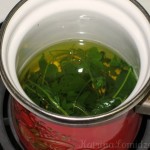Submitted by Joan McKnight
My interest in natural/herbal tea stems from my own upbringing. As a child growing up in Jamaica, I have had a tremendous opportunity to learn the importance of medicinal herbs from my own grandfather. He was an herbalist; he has successfully grown a number of Jamaica’s Indigenous plants and roots in his own garden on a hill next to our home. Growing up, it was a common practice or rather more like a ritual for my grandfather to prepare cerasse tea every Sunday morning. Frankly, there were many times that my siblings and I tried to resist the wrath of drinking cerasse tea because of its bitter taste. However, as long as I can remember, no one in my family has ever escaped drinking cerasse tea. My grandfather’s words of assurance were, “What is bitter to the mouth is good for the belly.” He often echoed this popular old proverb especially when he sensed any form of opposition to partaking in certain foods and drink. Moreover, he taught us that drinking cerasse tea was part of his own cultural upbringing and practice, and so we respect that he has passed down this cultural tradition to us, his grandchildren. Today, as a parent, I am proud to pass on this tradition of drinking cerasse tea to my own children and I am also proud to say that they appreciate each moment. If my grandfather was alive today, he too would be proud to see my children/his second generation sipping a cup of cerasse tea.
From this context, it gives me great pleasure to introduce “Cerasse” tea, also known as bitter tea because of its extreme bitter taste. In spite of its grisly bitter taste, cerasse tea is believed to cleanse the blood, prevent colds/flu, headaches, jaundice, stomach-ache and even helps to normalize blood sugar for those suffering from diabetes. From my own experience drinking cerasse tea over the years, I am a witness to its medicinal healing purposes from stomach-ache, colds/flu and even maintaining my good skin texture.
Looking back at the natural environment of my grandfather’s herb garden, I came to realize that his garden has served as a therapeutic landscape of healing, peace, and well-being for me and my family.



Recent Comments